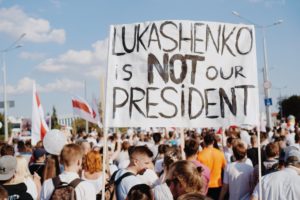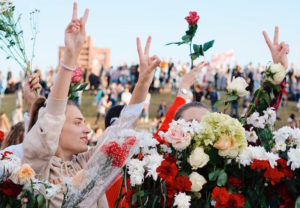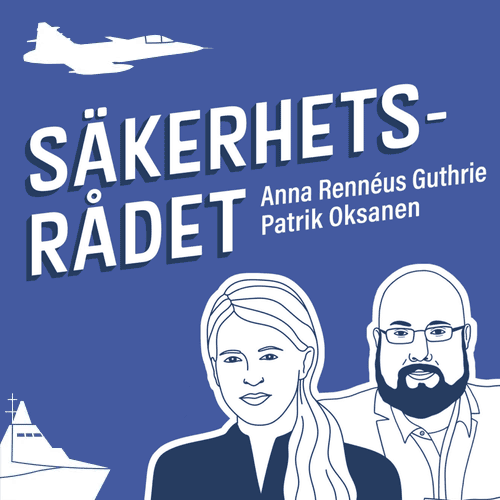This article is part of the Let The World Hear Project, which is a collaboration between Stockholm Free World Forum’s webzine Säkerhetsrådet and a number of Belarusian volunteers. Together we have gathered stories from victims of the dictatorship regime in 2020. The world must know what happened.
Read more about the project here.
This is the story of 35-year-old Olga, an oppositional activist from the city of Grodno. She was detained along with her friends and her boyfriend on 9 August 2020.

Protests in Minsk. Photo: Artem Podrez/Pexels
MB: Tell us how it all started.
It’s a long story. I began to participate in the protest movement during the election campaign, when officially authorized support rallies for Tikhanovskaya were still taking place. I joined the opposition headquarters. Even back then, the police weren’t showing their best side. On 9 August we cast our ballots and headed to the city [Grodno] before the results were announced. Due to my residency permit I was assigned to a polling station in a small town in the Grodno region. We had a pretty clear idea already from the lead-up to the election day that the results would be rigged, and that the only way for people to be heard was to take their voices to the streets. We got together with some friends near the central square of Grodno. The initial plan was to head to the square, but the OMON had sealed it off. In the square itself, people were being thrown into avtozaks, teenagers and elderly included. Even those who sat at the many open air cafes around the square were taken – they had simply been sitting there dining. Our group was being pushed by the OMON into a street located between the two central squares, Sovetskaya and Lenina. It was impossible to avoid being trapped. So we all ended up in the same street, with the exits sealed off, being pushed around between two OMON divisions on either end.
Another OMON division soon arrived and started to detain people. We heard a woman crying for help; she was with two children, a twelve- and a fourteen-year old; she was holding them close and screaming, “these are kids, are you going to shoot us, attack us?” We joined her and held hands, forming a chain. Other people started to join in. There were those who were in the protest march, but also bystanders who just happened to be nearby or were dining outside – this street is full of restaurants, shops and cafes. The OMON then stepped aside, forming their own chain, watching us from a distance and not moving closer. Ten to fifteen minutes passed and more officers showed up in full riot gear – shields, helmets – and started to head our way. Many people ran, but we thought, “let’s not be cowards”. So instead, my boyfriend and I turned around and walked towards OMON officers, making eye contact – and they stepped aside letting us pass. The two of us were among the last ones to be detained, by higher ranking officers who were coordinating the operation from the back. We were thrown in the last empty cell in the avtozak.
They took us to the RUVD, alongside many other people we knew. We decided to throw a party there, with all the friends gathered (laughs). This was on 9 August. Not many people were beaten up among those in my cell. It was an outdoor cell in the backyard, 5 x 6 metres, holding 30 or so women. Among us there was a journalist from tut.by and two Polish citizens who barely understood what was going on – they had been grabbed on the street somewhere. One woman had been badly beaten by a female OMON officer. She kept losing consciousness and we tried to revive her. She had marks from beatings and a large edema on her head, a chunk of hair was missing, 5 cm or so. We were given no water; we only had what some people had on them when being detained, so we pooled it all together in the middle of the cell for everyone to use. The cell had no toilet; we were taken to the toilet once an hour, two people at a time were allowed to go – I didn’t get a chance to go through the night. But in general, at the RUVD they treated us alright, it seemed like the staff themselves weren’t sure what was going on.
Meanwhile, new detainees kept arriving, but there was no space left. In the two-storey building, the cells were designed to hold four people but each now had twelve detainees, and those who didn’t fit in were kept outside. In our cell there were 30 girls; the cell next to us was for men, they told us they were 21 in total. Until 2 a.m. we just sat there on the bare concrete floor until the officers brought us mats from their fitness hall. The journalist was taken away around 1 a.m.; she had a yellow “press” vest on. The night got really cold, especially between 4 and 6 a.m.; we clung to each other like tinned sardines and tried to cover us with those mats. I had two extra t-shirts and a jumper in my backpack so I gave them to those in light summer wear. There were even girls in evening gowns, as they had been detained during a birthday celebration at a restaurant. Another girl said that her whole family had been taken into custody, including her husband and a five-year-old boy.
MB: Do you know what happened to the child?
Not until the morning when we found out that the child had been taken to the RUVD, where they got in touch with the grandmother to pass him to her. No answers were given to us whatsoever, including why we were detained. There was a sort of balcony upstairs, where the guards walked back and forth. We tried to ask questions but they would just ignore us. Some cell windows in the building itself were facing towards us so we could hear groans and screams of the men held there. One was having an asthma attack, struggling to breathe in a cell with twelve others and no air circulation. These cells – as I later found out – were 2.5 x 2.5 metres. People kept asking for an ambulance. I am not sure whether it arrived or not, but the screams stopped at some point. At 7 a.m. they took us to draw up the detention reports. The RUVD officers in charge had no clue where and when we got detained, so the reports were identical for everyone. No witness accounts, no signatures, no official stamps. It was borderline comical what the records said. I was detained with my boyfriend yet my report said I was arrested at 10 p.m. while his stated 11 p.m. The RUVD officers were tired and grumpy; they had been working for hours, preparing the cells in anticipation of mass detention. They had been pre-warned so they had released all those previously detained to make room for us.
MB: What happened after the reports were completed?
They took our phones on the grounds that they would serve as a guarantee that we would pay our fines – even though no fines had yet been issued. They just took what was valuable: phones, watches, etc. We were then taken to a new cell, five girls in a cell made for two. One of the girls was detained about lunchtime on the Election Day, she was an observer and attempted to report a violation. She had noticed that one of the ballot boxes that was supposed to be sealed had been opened, and a stack of extra ballots thrown in. Before she managed to file a violation report, OMON came and arrested her. Ironically, the official to whom she was to address the violation report was the perpetrator himself. She was still there in the cell when they let me go.
The court hearing was scheduled for 10 a.m., however the judges arrived at the RUVD in the afternoon. We were seven people at the hearing, but we heard from the staff that the total number detained on that day was 170 to 220, of whom 30 were female. The hearing was box standard too. Nobody was interested in our version of the events and no witnesses were present. My hearing took three minutes in total. I was ordered to pay a fine of 10 “base salaries”, that’s 70 roubles (equivalent to 100 euros). My boyfriend and others were issued similar or higher fines (10 to 15 base salaries). I heard that in other detention centres fines were even higher, 20 to 25, as the judges were tougher there.
MB: When were you released?
In the evening. Later, when speaking to others who were released before me, I found out that there were people gathered at the gate to greet those who came out, cheering and clapping. At some point the RUVD chief came out and said, “This is a non-approved mass gathering”. A couple of OMON vehicles arrived and they arrested about 12 people again, including a friend of mine who had been released just minutes before. He didn’t even have time to lace his shoes [they had taken the laces away when they arrested him]. This time he got 10 days in detention and a fine of 30 base salaries.
From 10 August and onwards, the beatings became more severe; first by the OMON during detentions and then in the RUVD, as the officers there were getting fed up with the whole situation and started to take it out on people. All of my friends who got arrested after the 10th came out black and blue. We went to the RUVD the next day to pick up the court papers. That’s where we saw some of these people being released, with badly bruised legs. But we don’t give up so easily and we even joke about it, shades of blue are in trend this season we say, so blue legs are now cool.
During detention, we had supported each other in every way we could. We sang songs, clapped, shouted “Freedom!” and told political anecdotes. Humour helped us to keep up our spirit and not give in to fear. Some girls were crying so we tried to lift the mood. Some of our boys who were in the other cells told us later that they could hear us singing. This helped everyone to survive that night and the next day. Nobody pleaded for mercy, we were all in this together and even made friends. So we are thankful to the OMON for this great opportunity to meet people (sarcastically), we now attend protest rallies together as a team. Even those bystanders grabbed from restaurants, with no political motivations whatsoever, are now very motivated and don’t miss a single rally.
We continue to joke, attend rallies and form female solidarity chains. In about half an hour there is a rally near the Grodno music hall as well as the tobacco factory, to support the workers who plan to strike. We also deliver water and pick up trash. It was my birthday yesterday, and I celebrated it at a rally. There was a concert of a popular band, Trubetzkoy – their songs have become protest anthems. We also take part in car rallies – we arrange these via the Telegram app and drive around in a convoy, with flags flying high. Every morning we come to the factories to support striking workers. So everyone is doing their part to keep the protest movement going. We’re not scared to get arrested again.

Women protesting. Photo: Artem Podrez/Pexels
In the Grodno region our coordinated efforts have achieved a breakthrough already. Previously you had to request a permit for a rally and then be allocated a remote location on the outskirts somewhere. Now our regional authorities allow meetings almost anywhere in the city, with no OMON presence. So we can now meet in the main square, with equipment such as stands and microphones supplied by the city authorities. Also, they are now obliged to live stream the rallies on the regional TV channel.
Overall, Grodno region was the first one to engage with the local authorities. There is a joint committee formed with representation of different political parties and movements for striking factories. We keep speaking to authorities, though it feels like they are just trying to buy time. Our key demands are the resignation of Lukashenka and criminal punishment for those responsible for the beatings and violence against our people. The regional authorities are saying that this is beyond their capacity, even though this isn’t true – the people’s deputies have the power to impeach the president.
We will continue. There are now many of us, including factory workers, and we’re very determined to achieve Lukashenka’s impeachment. The authorities are trying to apply pressure and bribe workers. At one point, the city council representatives came to the state-run Grodno tobacco factory and everyone got paid a 500 roubles bonus (equivalent to less than 180 euros) so that they wouldn’t support the protests. Yet they are still showing up at the rallies. Tonight at 5 p.m. we will gather to support them and the music hall staff. The drama theatre is also on strike; at some point they raised the red and white opposition flag over the building but it soon got removed. Many shops and cafes display the opposition flag as well. There is an incredible feeling of unity. During the female-only protests, which last for hours with girls standing in chains, our boys brought water, fruit, food, flowers and balloons. We got offered back massages and even sun spray on a hot day. Cars driving by were honking, drivers shouting, “thank you girls!” We’ve never been so united as a people, I never expected to see this kind of solidarity in my lifetime. It is an incredible feeling and gives us strength to carry on. We are in this together, we will carry on; there is no turning back now.
MB: At the very start of the protest movement, were there any coordinators or did the rallies happen spontaneously?
Everything happened spontaneously. For example, I subscribed to a Telegram channel as did many others from my area of Grodno. We were chatting and discussing ideas, such as whether to organize a car rally, something we now do on a daily basis. There are also three female channels where girls plan peaceful rallies, such as the flower rallies. Sometimes we split into different teams during the day so that we can support several striking factories for example, but we all gather in the main square in the evening. Ideas come from different people, and the chat participants organize themselves into action. There are the car rallies, but bike and motorcycle rallies have also taken place. So there is no main coordinator from whom you expect some sort of direction. We know that the whole country has taken to the streets. So those who organize and those who protest are the same people.
MB: Were you politically active before?
Before the elections I considered myself a member of the Grodno opposition. I took part in various opposition events, the last one was before New Year when legislation on further integration with Russia was about to be adopted. I attended protest rallies and arranged flash mobs. So yes, I have been a part of the opposition movement for a while now, ever since my university days. I am also involved in educational projects with our partner ABF Sweden – we arrange educational events on politics and economics. However, many people who are involved in the protests had little interest in politics until these elections. They now want to be heard, to take an active stand on the issue.
MB: What do you think the future holds?
We will not lose, this is the one thing that I’m certain of. There are too many of us now, there is no turning back. The bridges have been burnt. We don’t have any illusions of a rosy future though – that is, that a new person in power will make all the problems magically disappear. There are many uncertainties ahead and issues we are not even aware of. Belarus has large external debts, many factories are losing money or already bankrupt and are only surviving on government aid.
Things will likely get worse in the near future, as the true state of affairs will be revealed. But we are ready to work hard and follow our new future government to revive our country and our factories. Ready to work for the sake of the truth and our country and economy, not for another lush presidential palace to be built. A few of my friends who left Belarus years ago are saying that they will come back when the government changes, to help to restore the economy. I think the next five years will be tough. But we are hoping for a breakthrough and we will work hard for it.
The story was originally told in Russian to Margareta Barabash and translated by Maria Thompson.
